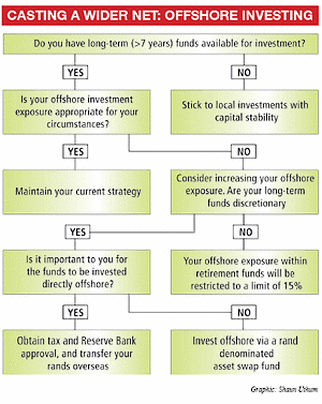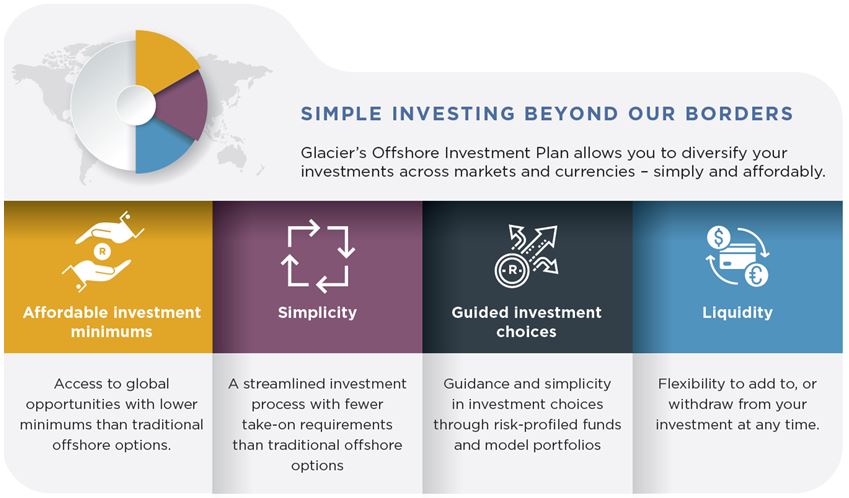Investing Off Shore: What High-Net-Worth Individuals Should Consider
Comprehending the Importance of Spending Off Shore for Wide Range Diversification
Offshore investing plays a significant role in wealth diversity. It enables individuals to touch into a larger variety of global markets and investment possibilities - Investing Off Shore. This technique can properly minimize risks tied to domestic economic unpredictabilities. Additionally, offshore financial investments may offer regulative and tax obligation benefits. Several continue to be unaware of the complexities and subtleties entailed. Comprehending these elements is vital for any individual considering this method for their economic future. What variables should one consider before taking the dive?
The Idea of Offshore Spending
Offshore spending refers to the method of putting possessions in monetary markets outside one's home country, commonly to accomplish greater economic safety and diversity. This technique permits individuals and corporations to access different global markets, possibly taking advantage of different financial environments, currency worths, and investment possibilities. Investors may choose overseas make up factors such as governing benefits, tax obligation advantages, or personal privacy protection.The idea includes a variety of financial investment cars, consisting of supplies, bonds, property, and mutual funds, offered through international monetary establishments. Furthermore, offshore investing can assist minimize dangers related to residential market variations. By spreading financial investments around the world, people can potentially safeguard their wide range versus political or economic instability within their home country. Generally, offshore spending functions as a critical method to improve financial portfolios, offering accessibility to a broader selection of possessions and chances beyond neighborhood markets.
Advantages of Expanding Your Investment Profile

Threat Mitigation Strategies
Exactly how can financiers efficiently handle risk while taking full advantage of returns? One crucial method is possession allocation, which includes distributing financial investments throughout different asset classes to minimize direct exposure to any kind of single risk. Financiers can branch out geographically by consisting of overseas properties, which often behave in different ways than residential investments, thus lowering general portfolio volatility. Additionally, integrating alternative financial investments, such as genuine estate or assets, can provide extra risk reduction. Regularly rebalancing the profile assures that asset appropriations continue to be straightened with risk tolerance and investment goals. Recognizing market fads and economic indications can assist investors expect modifications and adjust their profiles appropriately. Ultimately, a well-structured investment strategy highlights diversification, intending to stabilize potential returns with acceptable degrees of danger.
Currency Diversity Advantages
Investors that include currency diversity right into their portfolios can enhance their capacity for returns while reducing direct exposure to local financial variations. By holding possessions in multiple money, they can maximize beneficial currency exchange rate motions and mitigate losses from currency depreciation in their home market. This strategy not only spreads risk however also opens avenues for financial investment in arising markets, which might supply greater growth capacity. In addition, money diversity can work as a bush versus rising cost of living and political instability, providing a buffer during economic slumps. In general, this method promotes a much more resistant financial investment portfolio, permitting financiers to navigate global markets with higher versatility and self-confidence, inevitably leading to enhanced long-term monetary stability.
Decreasing Risk Via Geographical Diversification
Geographical diversity provides significant benefits by spreading out financial investments across different areas and markets. This technique helps reduce dangers related to financial instability, as downturns in one location might be balanced out by development in another. In addition, purchasing emerging markets can give distinct chances for greater returns and further enhance portfolio resilience.
Advantages of Geographic Diversity
Why should one take into consideration geographical diversification as a strategy for danger decrease? Geographic diversity allows investors to spread their assets throughout various countries and areas, reducing the effect of local financial declines. By purchasing several markets, one can profit from various growth cycles, money activities, and market dynamics. This approach reduces dependence on a single economy, which can be susceptible to political instability or all-natural catastrophes. Additionally, geographical diversification can boost portfolio efficiency by tapping into emerging markets with high growth potential. It supplies a barrier against inflation rates that may differ by area, making certain that the overall value of investments continues to be secure. Inevitably, geographic diversity is a prudent approach for protecting wide range versus unpredictable worldwide events.
Lessening Financial Instability Dangers

Economic instability can position considerable hazards to investment profiles, making it crucial to embrace methods that minimize these dangers. One effective method is geographical diversification, which involves spreading out investments across numerous areas and countries. By alloting possessions in different financial settings, capitalists can reduce their direct exposure to local economic downturns. If one nation deals with an economic crisis, financial investments in various other areas may remain secure or even succeed, offering a barrier against potential losses. In addition, spending in several money can better safeguard versus money changes and inflation risks. In general, minimizing economic instability risks via geographical diversification not just improves durability however also settings investors to confiscate chances in numerous markets, inevitably fostering long-lasting monetary protection.
Investing in Emerging Markets
Buying arising markets provides a calculated method for decreasing danger via geographical diversification. These markets, often characterized by quick development and developing economic landscapes, can offer special possibilities that are much less correlated with developed markets. By alloting sources to countries with expanding and blossoming industries customer bases, investors can minimize the impact of localized financial recessions. In addition, arising markets might display greater growth potential, enabling financiers to profit from beneficial group fads and raising international demand. Nevertheless, it is vital to acknowledge the inherent threats, consisting of political instability and money variations (Investing Off Shore). A well-researched and balanced strategy allows investors look these up to harness the benefits of arising markets while effectively taking care of potential drawbacks, inevitably boosting their total portfolio resilience
Accessing Emerging Markets and Opportunities
As global markets develop, accessing emerging markets presents an engaging opportunity for wealth diversity. These markets commonly reveal quick growth capacity, driven by increasing consumer demand and technical improvements. Capitalists can take advantage of sectors such as modern technology, renewable resource, and infrastructure, which are critical in driving economic expansion in these regions.Strategically investing in emerging markets enables financiers to profit from favorable demographics and climbing middle-class populaces. This creates distinct possibilities for companies to grow and, subsequently, for investors to take advantage of significant returns. Furthermore, arising markets frequently exhibit lower connections with industrialized markets, offering a barrier against volatility.To efficiently accessibility these chances, investors can use numerous vehicles, consisting of exchange-traded funds (ETFs), common funds, and direct equity investments. By diversifying their portfolios with emerging markets, capitalists can improve their overall risk-adjusted returns while placing themselves advantageously in a constantly altering global landscape.
Currency Security and Hedging Methods

Lawful Factors To Consider and Conformity in Offshore Investing
Guiding through the intricacies of offshore investing requires a keen awareness of the legal landscape and compliance demands that vary by jurisdiction. Capitalists have to thoroughly recognize policies worrying foreign investments, taxes, and reporting commitments to assure compliance with both regional and worldwide laws. Several countries have particular legislations regulating the facility of overseas accounts and entities, which can include strict Know Your Customer (KYC) and Anti-Money Laundering (AML) regulations.Furthermore, capitalists ought to beware concerning potential lawful challenges, including tax evasion website link or unintended violations of safety and securities legislations. Involving with reputable lawful experts or monetary consultants aware of offshore guidelines is important to browse these intricacies. Furthermore, staying notified about changes in laws and policies is essential, as non-compliance can cause serious penalties. Ultimately, a thorough understanding of legal factors to consider warranties that offshore financial investments add positively to riches diversity without incurring lawful effects.
Steps to Begin With Offshore Investments
Numerous investors seeking to diversify their wealth may find the process of starting overseas financial investments both tough and satisfying. The first action includes comprehensive study to identify appropriate offshore jurisdictions that straighten with investment goals and supply beneficial laws. Following this, financiers must choose a reliable financial organization or investment company experienced in offshore financial investments. Opening an overseas account is critical, necessitating the submission of personal identification and compliance documents.Next, financiers ought to evaluate numerous financial investment choices, such as actual estate, common funds, or stocks, seeing to it they line up with danger tolerance and economic purposes. Consulting with financial advisors or legal experts can supply important understandings right into the complexities of offshore financial investments. Routine monitoring and re-evaluation of the financial investment profile are important to adjust to market changes and guarantee peak efficiency. By complying with these actions, capitalists can successfully navigate the offshore financial investment landscape.
Regularly Asked Questions
What Sorts Of Properties Can I Buy Offshore?
The existing inquiry discovers different offshore financial investment choices. Individuals can take into consideration possessions such as property, shared funds, stocks, bonds, rare-earth elements, and cryptocurrencies, each offering distinctive advantages relying on personal economic objectives and run the risk of tolerance.
Are There Minimum Financial Investment Amounts for Offshore Accounts?
Minimum financial investment quantities for overseas accounts differ considerably relying on the establishment and sort of account. Some call for as little as a couple of thousand bucks, while others might stipulate higher limits for premium services and financial investment chances.
How Do Tax Obligations Deal With Offshore Investments?
Taxes on overseas financial investments differ by territory and the capitalist's home nation. Typically, revenue created may be subject to taxes domestically, while some countries may use tax obligation rewards or exemptions for sure overseas accounts.
Can I Manage Offshore Investments From Another Location?
Taking care of overseas investments from another location is undoubtedly feasible. Many banks offer on the internet systems, enabling investors to keep an eye on and transact seamlessly from anywhere, provided they follow regulatory demands and understand the involved risks and charges.
What Are Typical Misunderstandings Concerning Offshore Spending?
Typical false home impressions concerning overseas investing consist of the belief that it is specifically for the affluent, naturally unlawful, or excessively complicated. Actually, it can be accessible, legal, and manageable for various investors seeking diversity. By spreading financial investments across various property classes and geographical areas, capitalists can safeguard themselves versus market volatility and currency variations. Geographic diversity provides considerable benefits by spreading out investments across different areas and markets. Additionally, emerging markets often exhibit lower relationships with developed markets, using a buffer versus volatility.To effectively access these opportunities, financiers can make use of numerous vehicles, consisting of exchange-traded funds (ETFs), common funds, and direct equity investments. Following this, capitalists must select a reputable financial organization or financial investment company experienced in overseas investments. Normal tracking and re-evaluation of the investment profile are crucial to adjust to market changes and guarantee peak performance.